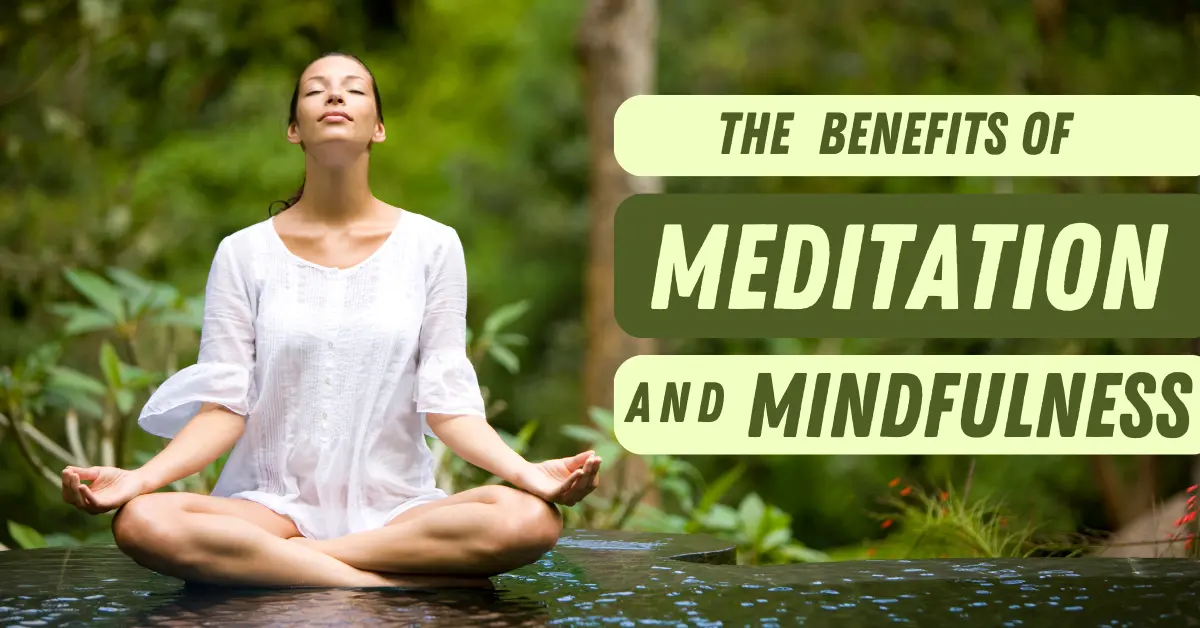
Meditation and mindfulness are important because they help us stay calm, focused, and present in our daily lives. By taking just a few minutes each day to breathe and relax, we can reduce stress, improve our mood, and handle challenges more easily. These practices help us connect with ourselves, boost our mental and emotional health, and create a sense of inner peace. Incorporating meditation and mindfulness into our routine can lead to a happier, healthier, and more balanced life.
The Benefits of Meditation and Mindfulness
In today’s fast-paced world, many people are turning to meditation and mindfulness to find peace and improve their well-being. These practices have been around for thousands of years, but they’re now more popular than ever. In this blog post, we’ll look at the benefits of meditation and mindfulness & what meditation and mindfulness are, and some easy ways to start using them in your daily life.
What Are Meditation and Mindfulness?
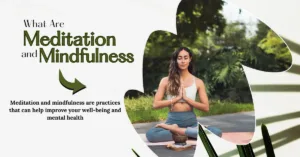
Before we talk about the good things that come from meditation and mindfulness, let’s understand what these terms mean.
A. Meditation is a practice where you use a technique – such as focusing on your breath, a word, or an object – to train your attention and awareness. The goal is to reach a clear and calm state of mind.
B. Mindfulness is the practice of being fully present and aware of where you are and what you’re doing. It’s about not being too reactive or overwhelmed by what’s going on around you.
While these are two different practices, they often go hand in hand. Mindfulness can be a type of meditation, and meditation can help you become more mindful in your daily life.
The Benefits of Meditation and Mindfulness
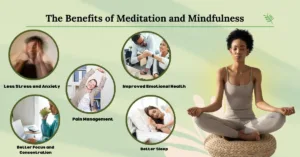
Now, let’s look at some of the ways meditation and mindfulness can improve your life:
1. Less Stress and Anxiety
One of the biggest reasons people try meditation and mindfulness is to reduce stress and anxiety. When you meditate, you learn to calm your mind and body. This can help lower the levels of stress hormones in your body. Over time, regular practice can make you better at handling stressful situations in your daily life.
2. Better Focus and Concentration
Meditation is like a workout for your brain. When you practice focusing your attention during meditation, you’re training your brain to concentrate better. This can help you stay on task and be more productive in your work or studies.
3. Improved Emotional Health
Meditation and mindfulness can help you understand and manage your emotions better. They help you notice your thoughts and emotions without criticism, leading to a more positive mindset and improved emotional stability.
4. Better Sleep
If you have trouble falling asleep or staying asleep, meditation might help. The relaxation techniques you learn can help calm your mind and body, making it easier to drift off to sleep. Mindfulness can also help you avoid the racing thoughts that often keep people awake at night.
5. Lower Blood Pressure
Some studies have shown that regular meditation can help lower blood pressure. This is likely because meditation helps reduce stress, which is a major factor in high blood pressure.
6.Pain Management
While meditation can’t make pain go away completely, it can change how your brain perceives pain. Mindfulness techniques can help you cope with chronic pain more effectively.
7. Increased Self-Awareness
Mindfulness practices encourage you to pay attention to your thoughts and feelings. This helps you gain deeper insight into yourself and your actions. With this awareness, you might find it easier to make positive changes in your life.
8. Kindness and Compassion
Some types of meditation focus on developing kindness and compassion, both for yourself and others. These practices can help improve your relationships and make you feel more connected to the people around you.
9. Better Memory
Studies have suggested that regular meditation might help improve your memory. This could be because meditation helps reduce stress and improves your ability to focus, both of which are important for forming and recalling memories.
10. Improved Immune System
Some research indicates that meditation and mindfulness practices might boost your immune system. This could help your body fight off illnesses more effectively.
How to Start Meditating and Practicing Mindfulness
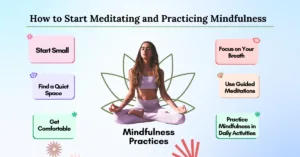
Now that you know about the benefits, you might want to try meditation and mindfulness for yourself. Here are a few easy steps to begin with:
1. Start Small
You don’t need to meditate for hours to see benefits. Just spending 5-10 minutes a day can have an impact. As you become more at ease, you can gradually extend the duration.
2.Find a Quiet Space
Select a peaceful spot where you won’t be disturbed. This could be a corner of your bedroom, a spot in your garden, or anywhere you feel comfortable.
3. Get Comfortable
You can sit in a chair, on the floor, or lie down comfortably. The important thing is to be in a position where you can stay still comfortably for the duration of your practice.
4. Focus on Your Breath
An easy way to begin is by concentrating on your breath. Notice the feeling of each inhale and exhale. If your mind drifts (which it will), softly refocus on your breathing.
5. Use Guided Meditations
Plenty of apps and online resources provide guided meditations. These can be very helpful for beginners as they lead you through the process step by step.
6. Practice Mindfulness in Daily Activities
You can practice mindfulness while doing everyday tasks. For example, when you’re eating, pay full attention to the taste, texture, and smell of your food. While walking, pay attention to the feeling of your feet making contact with the ground.
7. Be Patient and Kind to Yourself
Learning to meditate and be mindful takes time. Don’t get frustrated if your mind wanders or if you find it difficult at first. This is natural and a typical part of the process.
8.Make It a Habit
Try to practice at the same time each day. You can do this first thing in the morning, on your lunch break, or before bedtime. Staying consistent is essential for achieving lasting benefits.
9.Join a Group or Class
Think about joining a meditation group or enrolling in a mindfulness class. Learning with others can be motivating and helpful, especially when you’re just starting.
10.Keep a Journal
Writing about your experiences with meditation and mindfulness can help you track your progress and notice the changes in your life.
Common Challenges and How to Overcome Them
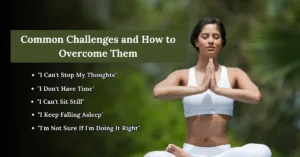
As you start your meditation and mindfulness journey, you might face some challenges. Here are a few common ones and how to deal with them:
1.”I Can’t Stop My Thoughts”
It’s a common misconception that meditation is about stopping all thoughts. The goal is not to have an empty mind but to observe your thoughts without getting caught up in them. When you notice your mind wandering, simply bring your attention back to your breath or whatever you’re focusing on.
2.”I Don’t Have Time”
Remember, even a few minutes of practice can be beneficial. You could try waking up a bit earlier, meditating during your commute (if you’re not driving), or taking a short break during your workday.
3.”I Can’t Sit Still”
If sitting still is uncomfortable, try a walking meditation or other forms of moving meditation like tai chi or yoga.
4.”I Keep Falling Asleep”
If you find yourself dozing off, try meditating at a different time of day when you’re more alert. You could also try sitting up straight or opening your eyes slightly.
5.”I’m Not Sure If I’m Doing It Correctly”
There’s no “perfect” way to meditate. As long as you’re setting aside time to be present and aware, you’re on the right track. If you’re unsure, consider taking a class or using guided meditations to build your confidence.
Conclusion
Meditation and mindfulness are powerful tools that can help improve many aspects of your life. From reducing stress and anxiety to improving focus and emotional health, the benefits are numerous. Remember, like any skill, meditation, and mindfulness take practice. Be kind to yourself while you’re learning.
Starting with just a few minutes a day can make a big difference over time. As you continue to practice, you may notice positive changes in how you feel and how you react to the world around you. Why not give it a try? Your mind and body may appreciate it.
FAQs
A. What is meditation?
Meditation is a practice where you focus your mind to achieve calmness and clarity. It helps reduce stress, improve concentration, and promote a sense of well-being, making it easier to handle daily challenges.
B. How does mindfulness help?
Mindfulness involves being conscious of the present moment without passing judgment. It helps you appreciate life more, reduces anxiety, and enhances your overall happiness by encouraging you to focus on what’s happening right now.
C. Can meditation reduce stress?
Yes, meditation can significantly reduce stress. By calming the mind and relaxing the body, it helps lower stress hormones, leading to a more peaceful state of mind and improved emotional health over time.
D. How often should I meditate?
For best results, try to meditate daily. Even just 5 to 10 minutes each day can improve your mood and focus. Slowly extend the duration as you grow more at ease with the practice.
E. Is meditation suitable for everyone?
Absolutely! Meditation is accessible to everyone, no matter their age or background. It’s a flexible practice that can be adapted to fit individual needs, making it accessible and beneficial for all seeking mental clarity and peace.
Also Read:
How Yoga Enhances Both Physical and Mental Well-being
7 Healthy Morning Routines for a Great Start to Your Day
References:
https://www.ncbi.nlm.nih.gov/pmc/articles/PMC10355843/
https://www.ncbi.nlm.nih.gov/pmc/articles/PMC7287297/
https://en.wikipedia.org/wiki/Mindfulness
Disclaimer: The information provided in this blog about the benefits of meditation and mindfulness is for educational purposes only. It is not a substitute for professional medical advice. Please consult a healthcare provider before starting any new wellness practices.
Related post

7 Health Benefits of Assam Tea


